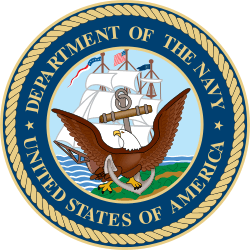HSC-7
| Helicopter Sea Combat Squadron 7 | |
|---|---|
|
HSC-7 Dusty Dogs insignia | |
| Active | December 15, 1969 - present |
| Country | United States of America |
| Branch |
|
| Type | Helicopter Squadron |
| Part of | Carrier Air Wing 3 |
| Garrison/HQ | Naval Station Norfolk |
| Nickname(s) | "Dusty Dogs" |
| Commanders | |
| Current commander | Commander Steve Minihane |
HSC-7 Helicopter Sea Combat Squadron Seven, also known as the Dusty Dogs, is a United States Navy helicopter squadron located at Naval Station Norfolk. They are attached to Carrier Air Wing Three and deploy aboard USS Dwight D. Eisenhower.
History
HSC-7 traces its lineage to the second of two squadrons which have borne the designation Helicopter Antisubmarine Squadron SEVEN (HS-7). That Squadron which has become HSC-7 was established on December 15, 1969.[1]
The first squadron designated HS-7 was established on April 2, 1956 at Naval Air Station Norfolk, VA for the purpose of harbor defense. The squadron was known as the "Big Dippers" and flew the HSS-1 Seabat. By 1960 the squadron had been assigned the role of Antisubmarine Warfare in support of fleet ships. The squadron deployed aboard USS Valley Forge (CVS 45) flying the autopilot equipped HSS-1N Seabat giving it the ability to operate at night and in marginal weather. in September 1962 the squadron's helicopters were re-designated the SH-34J Seabat in compliance with the 1962 United States Tri-Service aircraft designation system. On May 31, 1966 the squadron was disestablished.[1]
On December 15, 1969, the second squadron designated HS-7 and the squadron which has become HSC-7 was established at NAS Quonset Point, RI. It was equipped with the Sikorsky SH-3D Sea King and it adopted the name "Big Dippers" in honor of the previous HS-7. During a respite between cruises in 1970-71, the squadron held a naming contest, resulting in the “Big Dippers” becoming the “Shamrocks”. In 1973, HS-7 joined Carrier Air Wing THREE (CVW-3), changed homeport to Naval Air Station Jacksonville, Florida, and transitioned to the venerable SH-3H Sea King helicopter.[1]
From 1981 to 1993, the Shamrocks deployed numerous times in USS John F. Kennedy (CV-67), including deployments in support of Operations DESERT SHIELD and DESERT STORM. In December 1993, the Shamrocks and CVW-3 shifted to USS DWIGHT D. EISENHOWER (CVN-69), affectionately called “IKE”. In 1994, HS-7 became the first HS squadron on the east coast to be assigned female sailors and officers. In September 1994, HS-7 was tasked to support “IKE” which had embarked the US Army’s 10th Mountain Division off the coast of Haiti during Operation UPHOLD DEMOCRACY. Later that same year, HS-7 deployed to the Persian Gulf in support of Operation SOUTHERN WATCH and to the Adriatic Sea during Operations DENY FLIGHT and PROVIDE PROMISE.[1]
Upon returning from “IKE” in 1995, the Shamrocks transitioned to the Sikorsky SH-60F and HH-60H helicopters. It also changed its nickname from "Shamrocks" to “Dusty Dogs” which had been the squadron's call sign for some time. In May 1997, the squadron completed its first deployment flying the new aircraft from USS Theodore Roosevelt (CVN-71). HS-7 deployed again from October 1998 to May 1999 in USS Enterprise (CVN-65) in support of Operations DESERT FOX and DELIBERATE FORGE.[1]
Departing in late 2000, attached to Carrier Air Wing Three (CVW-3) the wing completed the maiden cruise of USS Harry S. Truman (CVN-75) returning in June 2001. From December 2002 to April 2005, HS-7 deployed twice more on board TRUMAN. During the 2003 cruise the ship and airwing served in the Mediterranean and Adriatic Seas in support of Operations NORTHERN WATCH and IRAQI FREEDOM. In September 2005, HS-7 embarked in TRUMAN, went to the Gulf of Mexico in support of Hurricane Katrina relief efforts. During Joint Task Force Katrina, HS-7 conducted 222 evacuations, 500 rescues, 90 MEDEVACS, and delivered over 27,000 pounds of food, supplies, and other essential cargo. From November of 2007 to June 2008, the Dusty Dogs again deployed aboard TRUMAN with CVW-3 in support of Operations IRAQI FREEDOM and ENDURING FREEDOM. From June 2008 to May 2010 the Dusty Dogs met the challenges of an extended work-up cycle, which included eight at-sea periods, two air wing trips to NAS Fallon, and four detachments to the Atlantic Undersea Test and Evaluation Center (AUTEC).[1]
In May 2010, HS-7, still attached to CVW-3, departed again in TRUMAN for a seven month deployment to the 5th Fleet AOR. The Dusty Dogs supported Carrier Strike Group 10 ships participating in Operations ENDURING FREEDOM and NEW DAWN while providing the strike group with essential anti-terrorism force protection, logistic, MEDEVAC, and SAR support. Cruise highlights include the night rescue of eight Iranian mariners in the North Arabian Sea and joint rotary wing training with the Royal Air Force of Oman – a first in the history of U.S. Naval helicopter aviation. In November 2010, after 41 years of excellence in Antisubmarine warfare, HS-7 ‘sundowned’ their ASW mission when they went “ball dry” for the last time.[1]
On April 15, 2011, in conjunction with its transition to the MH-60S Seahawk and homeport change from Naval Air Station Jacksonville to Naval Station Norfolk, Helicopter Antisubmarine Squadron SEVEN was re-designated Helicopter Sea Combat Squadron SEVEN (HSC-7). Upon completion of the transition, HSC-7 was re-assigned to CVW-3 which is currently attached to USS Dwight D. Eisenhower (CVN-79). HSC-7's roles are now Anti-Surface Warfare, Combat Search and Rescue, Naval Special Warfare Support, overwater Search and Rescue and Vertical Replenishment in support of the Carrier Strike Group.[1]
_patch_2015.png)
